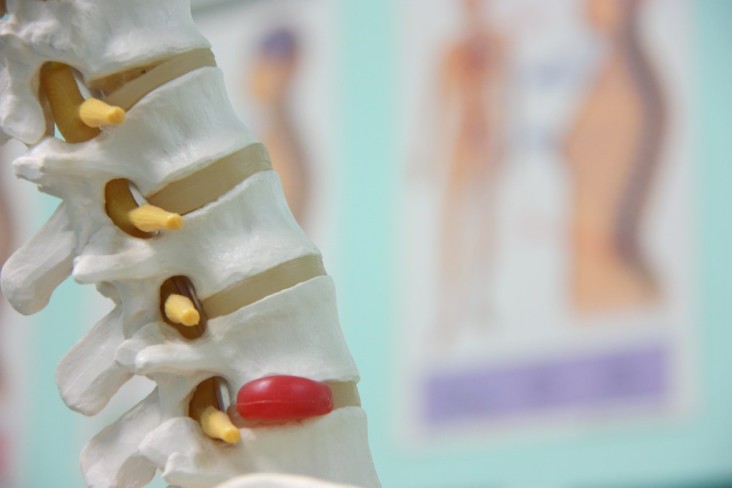Spinal disc herniation is an injury in which t connective and cushioning tissue between vertebrae become injured. Spinal disc herniation occurs when the fibrous outer portion of the disc ruptures or tears, and the jelly-like core squeezes out. If disc material herniates, or squeezes out, this can put pressure on the spinal cord or spinal nerves.
Causes of spinal disc herniation:
- Excessive strain or trauma to the spine
- Age related degeneration of the outer ring which is known as the anulus fibrosus
- Falling from a significant height
- Overweight individuals are also at increased risk for a slipped disc
- Lifting a very large, heavy object
- Weak muscles and a sedentary lifestyle
- Heavy forces on the neck or low back
- Bending with wrong or bad posture
Symptoms of disc herniation:
Symptoms of spinal disc herniation include the following;
- Pain and numbness, most commonly on one side of the body
- Pain that extends to your arms or legs
- Pain that worsens at night or with certain movements
- Pain that worsens after standing or sitting
- Pain when walking short distances
- Unexplained muscle weakness
- Tingling, aching, or burning sensations in the affected area
Types of spinal disc herniation:
Spinal disc herniation can occur in 3 regions;
- Cervical spine
- Thoracic spine
- Lumbar spine
When spinal disc herniation occur in cervical spine region, it put pressure on a cervical spinal nerve and can cause symptoms like pain, pins and needles, numbness or weakness in the neck, shoulders, or arms. In worst cases, spinal disc herniation may compress the spinal cord within the spinal canal.
In case of thoracic spine, spinal disc herniation cause pain in the mid back around the level of the disc herniation which may travel around the rib cage from the back to the front of the chest or upper abdomen. It may also compress the spinal cord within the spinal canal.
When spinal disc herniation is ion the lumber spine it causes spasm of the back muscles, sciatica, muscle weakness in the legs, incoordination and difficulty walking.
Diagnosis of spinal disc herniation:
If someone has symptoms associated with spinal disc herniation, then doctor would do following diagnostic procedures to confirm;
- MRI; method of imaging the spinal cord, nerve roots, intervertebral discs, and ligaments.
- CT scan; allows doctors to see inside your body. It uses a combination of X-rays and a computer to create pictures of your organs, bones, and other tissue.
- Myelography; involves injecting a liquid dye into the spinal column followed by a series of X-rays and a CT scan, provide useful images that reveal indentations of the spinal fluid sac.
- Electromyography; tests the electrical activity of a nerve root to help determine the cause of pain.
Treatments:
Treatment of spinal disc herniation depends upon the severity of symptoms and nerve damage. In many cases, medication management and quality physical therapy may be enough to allow your body to heal.
- Medications; these may involve steroids, non-steroidal anti-inflammatory drugs (NSAIDs), pain medications, and muscle relaxers to help control symptoms and reduce inflammation.
- Physical therapy; improves mobility and strength, and helping achieve daily activities with greater ease and ability
- Epidural steroid injection; when other conservative measures do not work then epidural steroid injection would become a treatment option for spinal disc herniation. Injection contain small amount of cortisone which injected into the spinal canal which may decrease nerve inflammation and ease pain caused by irritated nerve roots.
Most patients will improve with non-operative care and if the patient wont improves with non-surgical options then minimally invasive surgical interventions are usually highly successful in eliminating the symptoms and allowing people to return to a full and active lifestyle.
Pain management institute is helping people to cure acute and chronic long term pain to resume a normal life style. PMI has provided many treatments like stem cell therapy and many others.
For more details call on 815.412.6166

